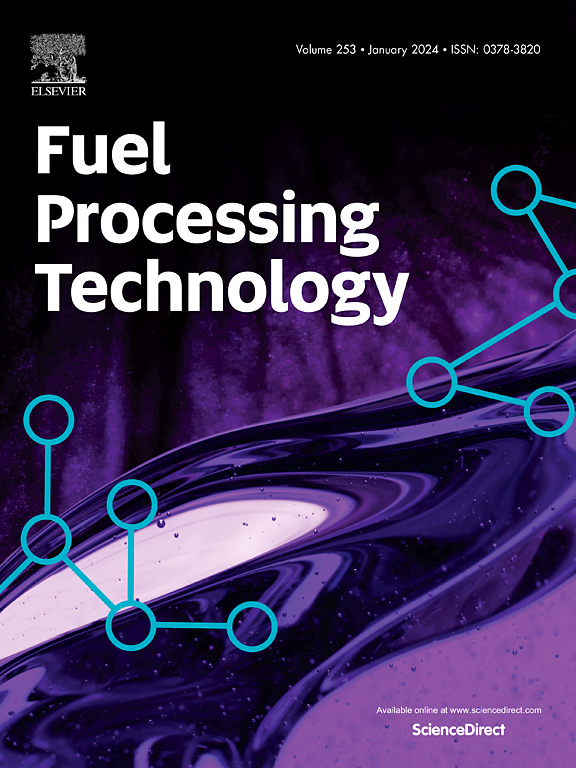Exploration on physicochemical properties and combustion behaviors of hydrochar from co-hydrothermal carbonization of swine manure and tea waste
IF 7.7
2区 工程技术
Q1 CHEMISTRY, APPLIED
引用次数: 0
Abstract
Co-hydrothermal carbonization (co-HTC) of animal manure and lignocellulosic biomass is recognized as an innovative approach to improve the quality of hydrochar derived from the HTC of animal manure. This study explored the effects of mass mixing ratio and temperature on the physicochemical properties and combustion behaviors of hydrochar from co-HTC of swine manure (SM) and tea waste (TW). The synergistic effect between SM and TW promoted the deoxygenation of SM and the aromatization of hydrochar. Compared to hydrochar from HTC of SM, the carbon content and higher heating value increased considerably, reaching the maximum of 48.64 % and 19.94 MJ/kg, respectively. Less lamellar structure and numerous microspheres were observed on the surface of hydrochar produced at 250 °C with 1/1 mass ratio. Additionally, the combustion performance of hydrochars from co-HTC were improved, as indicated by increases in the comprehensive combustion index and combustion stability index. Kinetic analysis showed that the activation energy of hydrochar increased with the increasing TW proportion and temperature. These findings provided valuable insights into the co-HTC of SM and TW, supporting the effective upgrading of animal manure and lignocellulosic biomass.
猪粪与茶渣共水热炭化烃类的理化性质及燃烧行为探讨
动物粪便和木质纤维素生物质的共水热碳化(co-HTC)被认为是提高动物粪便共水热碳化所得碳氢化合物质量的一种创新方法。研究了质量配比和温度对猪粪(SM)和茶渣(TW)共混氢炭理化性质和燃烧行为的影响。SM和TW的协同作用促进了SM的脱氧和烃类的芳构化。与SM的HTC生成的烃类相比,含碳量和高热值显著增加,最高分别达到48.64%和19.94 MJ/kg。在250℃条件下以1/1的质量比制备的碳氢化合物表面具有较少的片层结构和大量的微球。此外,通过综合燃烧指数和燃烧稳定性指数的提高,co-HTC的碳氢化合物的燃烧性能得到了改善。动力学分析表明,随着TW比例的增加和温度的升高,烃类的活化能增大。这些发现为SM和TW的共同htc提供了有价值的见解,支持了动物粪便和木质纤维素生物质的有效升级。
本文章由计算机程序翻译,如有差异,请以英文原文为准。
求助全文
约1分钟内获得全文
求助全文
来源期刊

Fuel Processing Technology
工程技术-工程:化工
CiteScore
13.20
自引率
9.30%
发文量
398
审稿时长
26 days
期刊介绍:
Fuel Processing Technology (FPT) deals with the scientific and technological aspects of converting fossil and renewable resources to clean fuels, value-added chemicals, fuel-related advanced carbon materials and by-products. In addition to the traditional non-nuclear fossil fuels, biomass and wastes, papers on the integration of renewables such as solar and wind energy and energy storage into the fuel processing processes, as well as papers on the production and conversion of non-carbon-containing fuels such as hydrogen and ammonia, are also welcome. While chemical conversion is emphasized, papers on advanced physical conversion processes are also considered for publication in FPT. Papers on the fundamental aspects of fuel structure and properties will also be considered.
 求助内容:
求助内容: 应助结果提醒方式:
应助结果提醒方式:


